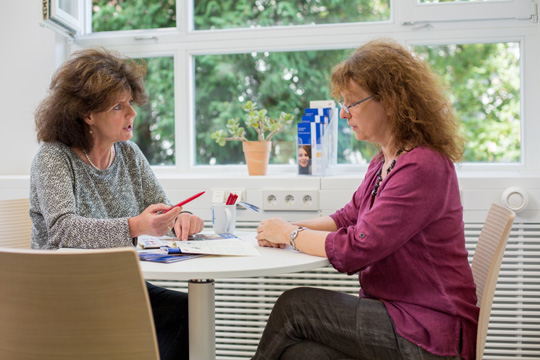Why Parents’ Evenings are worthwhile
Freiburg, Oct 04, 2017
It’s one of the first major decisions that a young person has to take: choosing which subject to study. More and more parents are wondering how and whether they can support their son or daughter with the choice. In order to tackle the uncertainties that arise with the transition from school to university, the Central Academic Advice Office at the University of Freiburg offers an information evening once a year with the title “Parents’ Evening – a dialogue with the Academic Advice Office”. Sonja Seidel chatted about the program with Ute Benninghofen, study advisor at the Student Service Center and organizer of the evening’s talks and discussions.

Helicopter parents are a minority, says study advisor Ute Benninghofen (left) – she sees most parents who come to her as offering guidance in the positive sense. Photo: Baschi Bender
Ms Benninghofen, why do you have Parents’ Evenings?
Ute Benninghofen: In recent years the number of parents who want to support their children with their choice of studies has increased – the information evenings are in response to this. My exchanges with study advisors from other universities have shown that this isn’t unique to Freiburg, but rather something that is widely observed. Naturally, as an advisor, I wondered whether such a program is a good idea. But my experience so far has shown that the fear that it would lead us to attract what are known as helicopter parents to the university hasn’t materialized.
So who is coming?
First of all: even before there was a term for it there have really always been helicopter parents such as those who are so often brought up in public debate which the media has played up, and they were and are a small minority, as ever. By definition they are over-involved, restrict their children’s autonomy and place the blame elsewhere when something goes wrong with their children. But clearly: not all interested parents are helicopter parents. I always take those who come to me as offering guidance in the positive sense of the word instead and I don’t have the feeling that they are preventing their children becoming independent. In fact, they are often seen as important partners in the discussion about the upcoming changes in their lives by their daughters and sons, and – in my special role as advisor – in choosing a subject to study. This impression is also confirmed by accompanying evaluations and feedback forms.
What sort of questions do parents ask?
If they come to the individual meeting, they don’t usually want to take part actively in the advice session but just to listen. Or if they do, then it’s usually asking about information or for clarification: details about Bachelors’, Masters’ and Credit Points and how long does a degree take these days? What is the financing like? What scholarships are there? How and where can you find out about degree programs?
Do young people need more support than they used to?
I think so, and there are two reasons for this: since the Bologna reform, options for studying have become extremely specified. For instance, the Hochschulkompass, or Higher Education Compass, a database supported by the German Rectors’ Conference (HRK), lists around 20,000 study options. So this makes the path through the information jungle incredibly confusing. In addition, eight years in high school means that potential students are younger today. Between the ages of 16 and 19, one year means a lot with regard to maturity, so the desire for support is correspondingly greater. The two introductory presentations at the Parents’ Evenings try – not without success – to meet both sets of needs: the desire for information and support.
What sort of support is available?
One key message to parents is that course orientation is always an individual process and that parents can be good guides for part of the way. That also means: let your child take the time they need, it’s okay. And a year out after taking the Abitur doesn’t destroy a career. One good form of support is definitely when parents are willing to talk and the young people can speak openly about their thoughts on studying. It helps when parents talk about the strengths they believe their son or daughter has and maybe also inform them about possibilities that can help with orientation and decisions. So it’s also about the parents speaking to their children as equals and so encouraging their own initiative. But once the decision is made, that’s it: once children are studying parents have to let go.
Parents’ Evenings
The next Parents’ Evening takes place on 9th October 2017 from 19:30 in Collegiate Building I, Lecture Theater 1015, Platz der Universität 3, 79098 Freiburg. no need to register. The themes of the talks are:
“Many ways – one goal?! Orientation and decisions – how parents can provide support when choosing studies”
“Bachelor, Master, Credit Points and Modules – what is studying like today?”
More information

